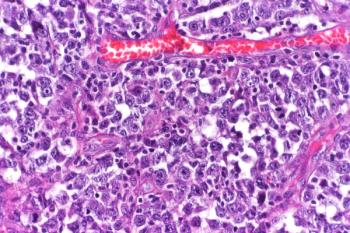
Although healthy patients do not currently require a third dose of the vaccine, the FDA has authorized the use of an additional dose of the Pfizer or Moderna COVID-19 vaccines for individuals who are immunocompromised.

Your AI-Trained Oncology Knowledge Connection!


Although healthy patients do not currently require a third dose of the vaccine, the FDA has authorized the use of an additional dose of the Pfizer or Moderna COVID-19 vaccines for individuals who are immunocompromised.

Patients undergoing colon cancer treatment can either use their general practitioner or surgeon to lead their survivorship and improving quality of life.

Use of economic coping mechanisms were associated with scoring 26 or lower on the COST analysis, or Comprehensive Score for Financial Toxicity, in patients being treated for gynecologic cancers.

One in 3 popular cancer articles on social media contain potentially harmful misinformation, according to a report published in the Journal of the National Cancer Institute.

A systemic review and network meta-analysis investigated 3 trials and determined that acalabrutinib/obinutuzumab up front prolongs progression-free survival for patients with chronic lymphocytic leukemia vs other regimens.

The combination of pembrolizumab plus lenvatinib received approval by the FDA in the first-line setting for patients with advanced renal cell carcinoma following the results of the phase 3 CLEAR trial.

Pediatric patients with high-risk molecular subgroup group 3 medulloblastoma experienced an improvement in 5-year event-free survival after receiving therapy intensification with carboplatin.

The FDA granted a fast track designation for ALLO-605 based on its potential to treat patients with relapsed/refractory multiple myeloma who progressed on previous standard multiple myeloma therapies.

According to the results of the phase 2 KEYNOTE-629 trial, patients with locally advanced or recurrent/metastatic cutaneous squamous cell carcinoma appear to receive promising anti-tumor benefit from pembrolizumab.

Treatment with ibrutinib with or without rituximab was associated with a lower monthly health care cost compared with chemoimmunotherapy in a population of patients with relapsed/refractory mantle cell lymphoma.

United States Military Health System beneficiaries with colon cancer are more likely to have improved survival outcomes vs the general population, with a particularly notable benefit in Black patients.

The phase 2 KEYNOTE-158 trial has demonstrated promising responses in patients with microsatellite instability–high/ mismatch repair deficient advanced endometrial carcinoma, and led to the FDA accepting a review of a new supplemental biologics license application for the drug.

A priority review to a biologics license application has been granted by the FDA for adjuvant pembrolizumab in certain populations of patients with renal cell carcinoma who have undergone surgery.

A study published in Lancet Oncology indicated that children with low-risk acute lymphoblastic leukemia may be able to safely omit pulse therapy after 1-year of treatment.

Results from the DESTINY-Breast03 trial identified that trastuzumab deruxtecan improved survival in patients with HER2-positive metastatic breast cancer compared with trastuzumab emtansine.

Polatuzumab vedotin in combination with rituximab, cyclophosphamide, doxorubicin, and prednisone helped patients to achieve a significantly improved progression-free survival over the standard of care for previously untreated diffuse large B-cell lymphoma.

The use of metastasis-free survival as an end point for clinical trials in nonmetastatic castration-resistant prostate cancer has been given finalized guidance by the FDA.

Early phase data indicate that elranatamab may be a safe and efficacious treatment for patients with relapsed/refractory multiple myeloma

Investigators identified that early changes in standardized uptake value corrected for lean body mass may be able to predict pathologic complete response to pertuzumab AND trastuzumab in patients with HER2-positive breast cancer.

Patients with head and neck cancer who live in rural counties are 50% more likely to die from suicide compared with individuals residing in urban or metropolitan areas.

CancerNetwork® sat down with Sara A. Hurvitz, MD, at the 2021 ASCO Annual Meeting to talk about multidisciplinary care with geriatrician oncologists and the use of age-based analyses for diagnosis and following up of metastatic triple-negative breast cancer.

CancerNetwork® sat down with Sylvie Bonvalot, MD, PhD, at the 2021 ASCO Annual Meeting to talk about treatment options for high-grade or grade II sarcoma.

Trends towards missing key moments for end-of-life discussions when meeting with patients who have stage IV cancer can be overcome with existing strategies for successful EOL conversations.

The makers of eflapegrastim received a complete response letter from the FDA due to concerns over manufacturing.

Black veterans within the United States who could stand to highly benefit from definitive treatment were found to be less likely to undergo treatment than non-Black populations.

Pediatric and adolescent patients with acute lymphoblastic leukemia experienced similar outcomes when treated with either calaspargase pegol or pegaspargase.

Pembrolizumab met its primary end point of prolonged recurrence-free survival in the phase 3 KEYNOTE-716 trial for patients with stage II resected high-risk melanoma.

Results of the phase 3 EMPOWER-Lung 3 trial support the use of cemiplimab in advanced or metastatic non–small cell lung cancer.

Based on results from the phase 3 COSMIC-311 trial, the FDA has accepted an application for cabozantinib use in patients with differentiated thyroid cancer with refractory disease following radioactive iodine therapy.

The cost of treating and managing breast cancer will rise two-and-a-half times by 2030 due to expected increases in young women being diagnosed with metastatic disease.